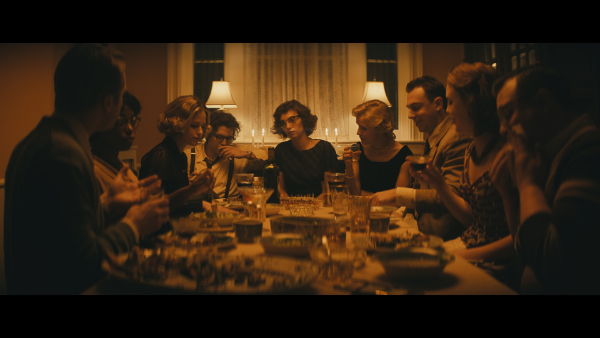Wildcat, the new movie about the life and writings of Flannery O’Connor, co-written and directed by Ethan Hawke, isn’t so much a biography of the Catholic writer, but an exploration of her struggle with suffering and God’s plan for her life.
O’Connor, played by Maya Hawke, was diagnosed with lupus at age twenty-four. Since her father had died of the disease, Flannery knew that her future would not be easy health-wise and she struggled to understand why God was calling her to this suffering.
The film begins in 1950, when O’Connor is living in New York trying to sell her first novel, but her editor feels that she’s trying to “pick a fight” with her readers. It almost becomes a running joke throughout the film as various people in her life encourage Flannery to write nice stories that people will actually want to read rather than the Southern Gothic style she’s embraced as her own.
When she’s diagnosed with lupus, she returns home to Georgia to live with her mother, Regina (Laura Linney), with whom she’s had a turbulent relationship. Regina’s one of the people who can’t understand why Flannery won’t write something nice.

Maya Hawke as Flannery O'Connor in "Wildcat." © 2024 Oscilloscope Laboratories. All Rights Reserved.
Viewers familiar with O’Connor’s writing will laud the way director Hawke has woven scenes from her short stories with her life. People unfamiliar with Flannery’s work may be confused as sometimes life and fiction tend to blur, especially since Laura Linney and Maya Hawke play many of the characters in the fiction scenes as well as real life Regina and Flannery respectively.
A hope is that people unfamiliar with O’Connor’s writings may be inspired to pick them up after understanding a little bit more of the background behind them. It seems like Flannery’s writings, exploring sin and redemption through the dark side of humanity, and while not being autobiographical, flow from her solid faith even amidst her spiritual struggles.

Maya Hawke as Flannery O'Connor in "Wildcat." © 2024 Oscilloscope Laboratories. All Rights Reserved.
The scene that best captures this is the one where a very sick Flannery is visited by Father Flynn (Liam Neeson). Their conversation goes from commenting on the writings of James Joyce to Flannery coming clean about the doubts she has. She tells Fr. Flynn, “I don’t know God because I’m in the way. My faith rises and falls like the tide of an invisible sea.” When she asks him if her writing can serve God, he responds, “Is your writing honest? Is your conscience clear?” When she says yes, he advises her, “then leave the rest to God.”
These spiritual struggles are ones that people of faith will probably be familiar with. Faith is a gift from God and we all have doubts about God’s action and plan for us from time to time, especially when we’re experiencing difficulties in life. A gift that Flannery O’Connor gives us is a vulnerable transparency and awareness of her own insignificance in the grand scheme of things. She explored the feelings of unworthiness and weakness she found inside herself in the stories she wrote. To a critic she responds, “I prefer not to tidy up reality.”
Yet, she holds fast to faith. In a conversation with friends one evening, someone mocked the Catholic understanding of the Eucharist as the true body and blood of Christ, declaring it was only a symbol. Flannery, in her characteristic no-nonsense style, remarked, “If it’s just a symbol, then to hell with it.” She was not afraid to talk about how much faith costs, saying that faith is the Cross, not an electric blanket.

Maya Hawke (middle) as Flannery O'Connor and cast in "Wildcat." © 2024 Oscilloscope Laboratories. All Rights Reserved.
Wildcat will hopefully drive people to explore O’Connor’s life, letters, and fiction writing for themselves. In struggling with the darkness in Flannery’s stories, perhaps we will come to a more honest awareness of the darkness within ourselves and the need we all have for the redemption of Jesus Christ, as Flannery was acutely aware.
For more information about the film please visit their website here.
About the Author
Sister Hosea Rupprecht is a member of the Daughters of St. Paul, a religious community dedicated to evangelization with the media. She holds a Master of Theological Studies degree from the University of St. Michael’s College in Toronto and an MA in Media Literacy from Webster University in St. Louis.
Sr. Hosea is director of the East Coast office of the Pauline Center for Media Studies, based in Staten Island, NY, and speaks on media literacy and faith to catechists, parents, youth, and young adults. Together with Father Chip Hines, she is the co-host of Searchlight, a Catholic movie review show on Catholic TV. Sr. Hosea is the author of How to Watch Movies with Kids: A Values-Based Strategy, released by Pauline Books & Media.
For the past 15 years, she has facilitated various film dialogues for both children and adults, as well as given presentations on integrating culture, faith and media.